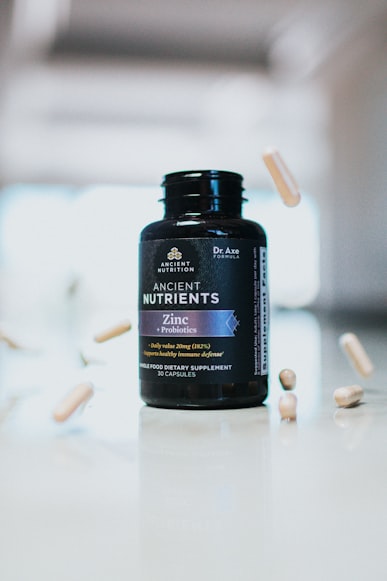The Ultimate Guide to Choosing the Best Joint Supplement for Dogs

As dog owners, we want our furry companions to live long, happy, and healthy lives. Joint health is crucial for their mobility, comfort, and overall well-being. When joints become weakened or damaged, dogs may experience pain, stiffness, and reduced mobility. Joint supplements can help support joint health and improve their quality of life.
Types of Joint Supplements
There are various types of joint supplements available, each with its unique benefits. Some common ingredients include:
- Glucosamine and Chondroitin: These natural supplements help form and repair cartilage, which cushions and supports joints.
- MSM (Methylsulfonylmethane): An organic compound that reduces inflammation and supports joint flexibility.
- Omega-3 Fatty Acids: Found in fish oils, these fatty acids have anti-inflammatory properties and support joint lubrication.
- Hyaluronic Acid: A naturally occurring substance that lubricates joints and absorbs shock.
Choosing the Right Supplement
Choosing the right joint supplement for your dog depends on several factors, including:
- Age: Puppies and young dogs may benefit from preventive supplements, while older dogs require supplements to address age-related joint issues.
- Breed: Some breeds, such as large or giant breeds, are more prone to joint problems.
- Activity Level: Active dogs put more stress on their joints, so they may need stronger supplements.
- Health Conditions: Dogs with joint disorders like arthritis or hip dysplasia require specialized supplements.
Ingredients to Consider
When choosing a joint supplement, look for products that contain:
- High-quality ingredients: Ensure that the supplements are from reputable sources and contain pure, active ingredients.
- Appropriate dosage: Follow the dosage instructions carefully, as excessive intake can be harmful.
- No harmful additives: Avoid supplements that contain fillers, artificial flavors, or sugars.
Safety and Side Effects
Most joint supplements are safe for dogs; however, it’s always important to consult with a veterinarian before using them, especially if your dog has any underlying health conditions. Some supplements may interact with certain medications or have potential side effects.
Signs of Improvement
Improvement from joint supplements may take several weeks to become noticeable. Some signs of improvement include:
- Increased mobility
- Reduced stiffness
- Less pain or discomfort
- Improved appetite and energy levels
Conclusion
Choosing the best joint supplement for your dog can improve their joint health, reduce pain, and enhance their overall well-being. By considering their age, breed, activity level, and health conditions, you can select a supplement that meets their specific needs. Always consult with a veterinarian before using any supplements to ensure safety and effectiveness. With the right joint supplement, you can help your furry friend live a healthier and more active life.
Understanding Joint Health in Dogs

Importance of Joint Health for Mobility and Comfort
Joint health plays a crucial role in the mobility, comfort, and overall well-being of our furry companions. Joints are the points where bones meet, allowing for movement and flexibility. When joints are healthy, dogs can move around painlessly and enjoy a full range of activities. However, when joint health is compromised, it can significantly impair their quality of life.
Common Joint Issues and Their Causes
Several common joint issues can affect dogs, including:
- Hip Dysplasia: This genetic condition occurs when the hip joint does not develop properly, causing instability and pain.
- Elbow Dysplasia: Similar to hip dysplasia, elbow dysplasia affects the elbow joint, leading to lameness and discomfort.
- Osteoarthritis: A degenerative disease that causes inflammation and breakdown of joint cartilage, leading to pain, stiffness, and mobility issues.
- Patellar Luxation: A condition where the kneecap (patella) slips out of place, resulting in lameness and discomfort.
- Tendon and Ligament Injuries: Overuse, trauma, or age can cause damage to tendons and ligaments that support joints, leading to pain and lameness.
Causes of Joint Issues in Dogs
Joint issues in dogs can arise due to various factors, including:
- Genetics: Some breeds are predisposed to certain joint conditions, such as hip dysplasia or elbow dysplasia.
- Age: As dogs age, the cartilage in their joints naturally breaks down, increasing the risk of osteoarthritis.
- Overweight or Obesity: Excess weight puts extra strain on joints, leading to inflammation and wear and tear.
- Excessive Activity: Strenuous activity without proper warm-up and recovery can stress joints and increase the likelihood of injuries.
- Trauma: Accidents or falls can cause fractures, dislocations, or other joint injuries.
Maintaining Joint Health in Dogs
Maintaining joint health is essential for the overall well-being of dogs. Here are some tips to help keep your dog’s joints healthy:
- Provide a Healthy Diet: Feed your dog a balanced diet that supports their weight and activity level. Avoid processed foods and opt for fresh, whole ingredients.
- Keep Your Dog at a Healthy Weight: Obesity puts a strain on joints. Consult with your veterinarian to determine the ideal weight for your dog and follow a consistent exercise and feeding plan to maintain it.
- Exercise Regularly: Moderate exercise helps strengthen muscles that support joints. Engage your dog in activities such as walks, swimming, or fetch to maintain their mobility.
- Use Joint Supplements: Joint supplements can help provide additional support and nourishment for joints. Look for supplements that contain ingredients like glucosamine, chondroitin, and omega-3 fatty acids, which have been shown to promote joint health.
- Monitor Your Dog’s Activity: Observe your dog for any signs of discomfort or lameness during activity. Restrict strenuous activity if your dog shows any signs of pain.
- Consult Your Veterinarian Regularly: Regular veterinary check-ups can help detect joint issues early on and recommend appropriate treatment options.
By understanding the importance of joint health in dogs and taking proactive steps to maintain it, you can help ensure that your furry companion enjoys a pain-free, active, and fulfilling life.
Types of Joint Supplements

As a dedicated dog owner, ensuring your furry companion’s well-being is paramount. Joint health is a crucial aspect of their overall vitality, especially as they age. Fortunately, there are numerous joint supplements available that can support and improve your dog’s joint function.
Types of Joint Supplements
Joint supplements can vary in ingredients and mechanisms of action. Here are three common types:
1. Glucosamine and Chondroitin
Glucosamine and chondroitin are naturally occurring compounds found in cartilage, the connective tissue that cushions and protects bones at joints. These supplements are believed to stimulate the production of new cartilage and reduce joint degeneration. Glucosamine may also have anti-inflammatory properties.
2. Hyaluronic Acid
Hyaluronic acid is a viscous substance found in the fluid that lubricates joints. It acts as a shock absorber, reducing friction and inflammation within the joint. Hyaluronic acid supplements can help improve joint mobility and reduce pain.
3. Omega-3 Fatty Acids
Omega-3 fatty acids are essential fatty acids that have numerous health benefits, including supporting joint health. They possess anti-inflammatory properties that can reduce pain and stiffness in affected joints.
Choosing the Right Supplement
Selecting the best joint supplement for your dog depends on their individual needs and health status. Factors to consider include:
- Age: As dogs age, their natural cartilage production decreases, making joint supplements more beneficial.
- Breed: Certain breeds, such as large or giant breeds, are more prone to joint problems.
- Health history: Dogs with previous joint injuries or osteoarthritis benefit from early supplementation.
- Diet: Some foods and treats contain chondroitin and glucosamine, so it’s important to consult with your veterinarian to ensure optimal supplementation.
Benefits of Joint Supplements
Joint supplements offer several potential benefits for dogs:
- Reduced pain and inflammation: Supplementation can alleviate joint pain and stiffness, improving mobility and comfort.
- Improved cartilage health: Glucosamine and chondroitin support cartilage production and repair, slowing down cartilage degeneration.
- Increased joint lubrication: Hyaluronic acid promotes joint lubrication, reducing friction and improving range of motion.
- Reduced risk of joint disease: Regular supplementation may help prevent or delay the onset of joint problems, such as osteoarthritis.
Administration and Safety
Joint supplements are typically administered orally in the form of tablets, capsules, or powder mixed with food. The dosage depends on the supplement and the dog’s weight and condition.
It’s important to consult with your veterinarian before giving your dog any joint supplements, as some may interact with certain medications or be contraindicated for dogs with specific health conditions.
Conclusion
Joint supplements can be a valuable addition to your dog’s health routine, supporting their joint health and mobility as they age. By understanding the different types of supplements and their benefits, you can make an informed decision and provide your furry companion with the necessary support for a long, comfortable, and active life.
Choosing the Right Supplementation

As a dog owner, ensuring the well-being and mobility of your loyal companion is paramount. Joint supplements play a crucial role in supporting canine joint health, especially for aging or active dogs with mobility issues. However, with a plethora of options available in the market, selecting the best supplement for your dog can be overwhelming. This article will guide you through essential factors to consider and provide insights into consulting with your veterinarian to make an informed decision.
Factors to Consider:
Age: The age of your dog significantly influences the type of joint supplement you should choose. Puppies typically have healthy joints and may not require supplementation unless they are particularly active or prone to joint problems. Adult dogs may start to benefit from supplements to support healthy aging joints. Senior dogs, on the other hand, often have joint stiffness and pain, requiring more comprehensive supplementation.
Breed: Certain breeds are predisposed to joint issues due to their size, structure, and activities. For instance, large and giant breeds like German Shepherds, Golden Retrievers, and Mastiffs may experience hip dysplasia, a common joint condition. Smaller breeds, such as Dachshunds and French Bulldogs, can develop spinal cord issues that affect their mobility. Choosing a joint supplement specifically designed for your dog’s breed can address specific joint needs.
Severity of Joint Issues: The severity of your dog’s joint problems also plays a role in selecting the appropriate supplement. Dogs with mild joint discomfort may benefit from less intensive supplements, while those with severe arthritis or mobility limitations may require more comprehensive support. Consider the stage and progression of your dog’s joint issues when choosing a supplement.
Consulting with a Veterinarian:
Before introducing any joint supplement to your dog’s diet, consulting with your veterinarian is essential. Your veterinarian can:
- Assess Your Dog’s Joint Health: They will conduct a physical exam to determine the extent of your dog’s joint issues and identify any underlying medical conditions that may be contributing to the problem.
- Recommend the Best Supplement: Based on your dog’s age, breed, and joint health, your veterinarian can recommend the most suitable joint supplement. They will consider the active ingredients, dosage, and potential interactions with other medications your dog may be taking.
- Monitor for Effectiveness: Your veterinarian can monitor your dog’s response to the joint supplement and make any necessary adjustments to the dosage or brand as needed. This ensures that your dog is receiving the optimal support for their joint health.
Conclusion:
Choosing the right joint supplement for your dog is crucial to supporting their mobility and overall well-being. By considering factors like age, breed, and the severity of joint issues, and consulting with your veterinarian, you can make an informed decision that meets your dog’s specific needs. With proper care and supplementation, your furry friend can enjoy an active and fulfilling life filled with joint comfort and vitality.
Ingredient Quality and Safety

As dog owners, it’s our responsibility to provide our furry companions with the best possible care, including maintaining their joint health. Joint supplements play a crucial role in supporting cartilage, reducing inflammation, and improving mobility in dogs with arthritis or other joint conditions. However, not all dog joint supplements are created equal.
Importance of Pure and Potent Ingredients
The effectiveness of a dog joint supplement hinges on the quality of its ingredients. When evaluating a supplement, look for products that contain:
- Glucosamine and chondroitin: These naturally occurring substances are essential for building and repairing cartilage.
- MSM: A sulfur-rich compound that reduces inflammation and promotes joint flexibility.
- Omega-3 fatty acids: Essential fatty acids that decrease inflammation and support healthy joints.
- Green-lipped mussel extract: A potent anti-inflammatory that helps protect cartilage and reduce pain.
Ensure that the ingredients are pure and potent. Avoid supplements with fillers or additives, such as corn syrup or artificial colors. These ingredients not only reduce the overall effectiveness of the supplement but can also pose health risks to your dog.
Avoiding Harmful Additives or Fillers
Certain additives or fillers can be harmful to dogs. Here are some ingredients to look out for:
- BHA and BHT: Artificial preservatives that can cause liver damage and other health problems.
- Artificial flavors and colors: Can trigger allergies or digestive issues.
- Corn syrup: A cheap filler that provides no nutritional value and can contribute to weight gain.
- Yeast extract: A common allergen that can cause skin irritation and digestive problems.
Other Considerations
In addition to ingredient quality and safety, consider the following factors when choosing a dog joint supplement:
- Dosage: The appropriate dosage will vary based on your dog’s weight and health condition. Consult with your veterinarian to determine the correct dosage.
- Administration: Joint supplements come in various forms, including capsules, chewables, and powders. Choose a form that is convenient for you and palatable for your dog.
- Third-party testing: Look for supplements that have been independently tested by organizations such as the National Animal Supplement Council (NASC) to ensure purity and safety.
Conclusion
Choosing the right joint supplement for your dog is essential for supporting their joint health and improving their quality of life. By focusing on ingredient quality, avoiding harmful additives, and considering other important factors, you can ensure that your furry companion receives the best possible care. Remember to consult with your veterinarian before administering any supplements to your dog.
Dosage and Administration
As a dog owner, ensuring the well-being and comfort of your furry companion is paramount. Joint supplements play a vital role in maintaining healthy mobility, especially for aging or active dogs. Determining the appropriate dosage and administration schedule is crucial to maximize the benefits of these supplements.
Determining the Appropriate Dosage
The dosage of joint supplements for dogs varies depending on factors such as the dog’s age, weight, breed, and activity level. Most supplement labels provide dosage guidelines based on body weight.
- Small dogs (less than 25 pounds): 500-1,000 mg of glucosamine and 200-400 mg of chondroitin per day
- Medium dogs (25-50 pounds): 1,000-1,500 mg of glucosamine and 400-600 mg of chondroitin per day
- Large dogs (over 50 pounds): 1,500-2,000 mg of glucosamine and 600-800 mg of chondroitin per day
It’s important to consult with your veterinarian to determine the optimal dosage for your individual dog, especially if they have any underlying health conditions or joint issues.
Frequency and Duration of Supplementation
Joint supplements are typically administered once or twice daily, depending on the manufacturer’s instructions. It’s important to be consistent with supplementation to ensure optimal absorption and effectiveness.
- Frequency: Most joint supplements are best given daily, either with meals or as treats.
- Duration: Supplementation should continue for as long as necessary to maintain joint health. For chronic joint conditions, long-term supplementation may be recommended.
Forms of Administration
Joint supplements come in various forms, including:
- Tablets or capsules: These are the most common form and can be easily mixed with food or given as treats.
- Chews: Chews are flavorful and often contain additional ingredients to enhance palatability.
- Liquids: Liquid supplements are ideal for dogs that have difficulty swallowing pills or for those who need a more precise dosage.
- Powders: Powders can be mixed with food or water, allowing for more flexibility in dosage.
Additional Tips
- Choose quality supplements: Look for supplements with ingredients from reputable sources and that meet quality standards.
- Monitor your dog for any adverse reactions: Some dogs may experience digestive upset or allergies to certain ingredients.
- Be patient: It may take several weeks or even months before you notice significant improvements in your dog’s mobility.
- Consider a veterinarian consultation: If your dog’s joint pain persists or worsens despite supplementation, consult with your veterinarian to rule out any underlying medical issues.
Conclusion
Joint supplements can be a valuable addition to your dog’s healthcare routine, providing support for healthy joints and mobility. By determining the appropriate dosage, adhering to the recommended frequency and duration of administration, and choosing quality supplements, you can help your furry companion maintain a happy and active lifestyle. Remember, consulting with your veterinarian is always advisable to ensure the best possible care for your dog’s health and well-being.
Long-Term Benefits
As our beloved canine companions age, the wear and tear on their joints can take a toll, leading to reduced mobility, pain, and diminished overall well-being. Fortunately, joint supplements offer a promising solution, providing long-term benefits that can significantly enhance the quality of your dog’s life. By incorporating these supplements into their daily regimen, you can support their joint health and lay the foundation for a longer, more active, and pain-free life.
Potential for Improved Mobility and Reduced Pain
Joint supplements contain a range of ingredients, including glucosamine, chondroitin, and MSM, which work together to promote cartilage health and reduce inflammation. By nourishing and rebuilding cartilage, these supplements help reduce friction in the joints, leading to improved mobility and a noticeable decrease in pain. This improvement in mobility can allow your dog to engage in their favorite activities, such as playing, exploring, and walking, without the discomfort they may have experienced before.
Enhanced Joint Function and Disease Prevention
The long-term benefits of joint supplements extend beyond pain relief. They can also help protect against the progression of joint disease, such as osteoarthritis. By providing essential nutrients to the joints, supplements help maintain their integrity and reduce the risk of further damage. This proactive approach can significantly enhance your dog’s joint function and overall well-being throughout their life.
Supporting an Active and Fulfilling Life
When your dog’s joints are healthy and pain-free, they will naturally be more active and engaged in their daily routines. The improved mobility afforded by joint supplements allows them to explore their surroundings, play with their toys, and enjoy quality time with you. This increased activity not only contributes to their physical health but also enhances their mental well-being and provides them with a sense of purpose and fulfillment.
Additional Benefits
In addition to the core benefits discussed above, joint supplements can offer a range of additional advantages for your dog, including:
- Boosted immune system
- Improved digestion
- Enhanced skin and coat health
- Reduced risk of obesity
- Increased energy levels
Choosing the Right Joint Supplement
When selecting a joint supplement for your dog, it is important to consider their age, size, and activity level. It is also crucial to look for high-quality products that contain proven ingredients and are manufactured by reputable companies. Your veterinarian can assist you in choosing the most suitable supplement for your dog’s individual needs.
Conclusion
Investing in joint supplements for your dog is an investment in their long-term health and happiness. By providing essential nutrients to their joints, you can potentially alleviate pain, improve mobility, enhance joint function, and protect against the progression of joint disease. With healthier joints, your dog will be able to enjoy a more active, fulfilling, and pain-free life for years to come. Consult with your veterinarian to determine the best joint supplement and dosage for your canine companion and experience the transformative benefits it can bring to their well-being.
Reviews and Testimonials
As dog owners, we want our furry companions to live long, healthy, and active lives. Joint health is crucial for their quality of life, enabling them to move comfortably, play, and enjoy all the things they love.
Choosing the best joint supplement for your dog can be overwhelming, with numerous options available in the market. To help you make an informed decision, we gathered insights and testimonials from other dog owners and veterinarians.
Understanding Joint Supplements
Joint supplements are designed to support joint health by providing essential nutrients, such as:
- Glucosamine: Promotes cartilage production
- Chondroitin: Helps maintain cartilage structure
- MSM (methylsulfonylmethane): Reduces inflammation
- Hyaluronic acid: Lubricates joints
Factors to Consider When Choosing a Supplement
- Dog’s age and activity level: Senior dogs and active breeds may benefit from higher doses of joint supplements.
- Joint condition: If your dog has been diagnosed with arthritis or other joint issues, consult your veterinarian before choosing a supplement.
- Ingredients: Look for supplements with high-quality, human-grade ingredients.
- Reviews and testimonials: Read independent reviews from other dog owners and veterinarians to get real-world feedback.
Reviews and Testimonials
1. Cosequin DS Plus with MSM
- “My 10-year-old golden retriever had been limping for weeks. After giving her Cosequin for a month, she’s back to running and jumping like a puppy!” – Mary J.
- “Our vet recommended Cosequin for our arthritic German shepherd. Within a few weeks, we noticed a significant improvement in his mobility.” – John D.
2. Nutramax Dasuquin with MSM
- “I tried several joint supplements for my labrador with no success. Dasuquin was the only one that made a noticeable difference in his pain and stiffness.” – Lisa C.
- “My veterinarian swears by Dasuquin. It has helped keep our 7-year-old husky healthy and active.” – Sarah B.
3. Pet Naturals Hip & Joint Chews
- “These chews are great for our small dachshund who has had joint problems. They’re easy to administer and have really helped improve his mobility.” – Kelly M.
- “I love that these chews are made with all-natural ingredients. They’ve been a lifesaver for my aging beagle.” – David H.
4. Glyco-Flex III
- “Glyco-Flex has been a game-changer for my senior dog with arthritis. It has reduced her pain and inflammation, allowing her to enjoy her golden years.” – Jessica A.
- “My vet introduced me to Glyco-Flex, and I’ve never looked back. It has kept my active border collie moving without any issues.” – Michael B.
5. Zesty Paws Joint Support Bites
- “These bites are the perfect treat for my picky dog. They’re packed with joint-supporting nutrients and have helped improve his mobility.” – Ashley P.
- “I’m so grateful for these bites. My dog has been suffering from joint pain, and they’ve made a huge difference in his comfort level.” – Laura W.
Choosing the Right Supplement for Your Dog
Ultimately, the best joint supplement for your dog will depend on their individual needs. Consult your veterinarian to discuss the best options and dosage. By providing your furry friend with the right joint support, you can help them maintain a healthy and active lifestyle for years to come.
Price and Affordability
As a responsible dog owner, maintaining your furry friend’s joint health is crucial. Joint supplements can play a vital role in supporting your dog’s mobility and reducing discomfort, but choosing the best option can be daunting, especially when considering cost and affordability.
Comparing Costs
Joint supplements vary widely in price depending on the ingredients, brand, and dosage. Here’s a breakdown of the average cost range for different types of supplements:
- Glucosamine and chondroitin: $20-$60 per bottle (typically 30-60 capsules)
- MSM (methylsulfonylmethane): $15-$40 per bottle (typically 100-200 tablets)
- Hyaluronic acid: $30-$80 per bottle (typically 30-60 capsules)
- CBD oil: $40-$150 per bottle (typically 30-100 ml)
Finding the Best Value
While cost is an important factor, it’s essential to consider the value you’re getting for your money. Here are some tips to help you find the best joint supplement for your dog at an affordable price:
- Read reviews: Check online reviews from other dog owners to get an idea of the effectiveness and cost-benefit ratio of different supplements.
- Compare ingredients: Look for supplements that contain high-quality ingredients like glucosamine, chondroitin, MSM, and hyaluronic acid. Avoid supplements that contain fillers or additives.
- Consider dosage: Supplements with higher dosages may be more expensive but will last longer. Choose a dosage that is appropriate for your dog’s size and activity level.
- Look for bundle deals: Many retailers offer discounts on bundle packs that include multiple bottles of the same supplement or a combination of different supplements.
- Consider generic brands: Generic brands often offer similar ingredients at a lower cost compared to name brands.
Additional Tips for Saving Money
- Buy in bulk: If you know your dog will be on joint supplements for an extended period, consider buying in bulk to save money over time.
- Use coupons and discounts: Sign up for pet supply store newsletters and follow brands on social media to stay updated on promotions and discounts.
- Consider subscription services: Some retailers offer subscription services that automatically ship a monthly supply of supplements at a discounted rate.
- Make your own: There are DIY recipes available online for making your own joint supplements using human-grade ingredients. However, it’s crucial to consult with your veterinarian before giving your dog homemade supplements.
Conclusion
Choosing the best joint supplement for your dog doesn’t have to break the bank. By considering cost, comparing ingredients, and following these tips, you can find an affordable option that supports your dog’s joint health and makes a noticeable difference in their quality of life. Remember, open communication with your veterinarian is essential for determining the best supplement and dosage for your furry friend.




















